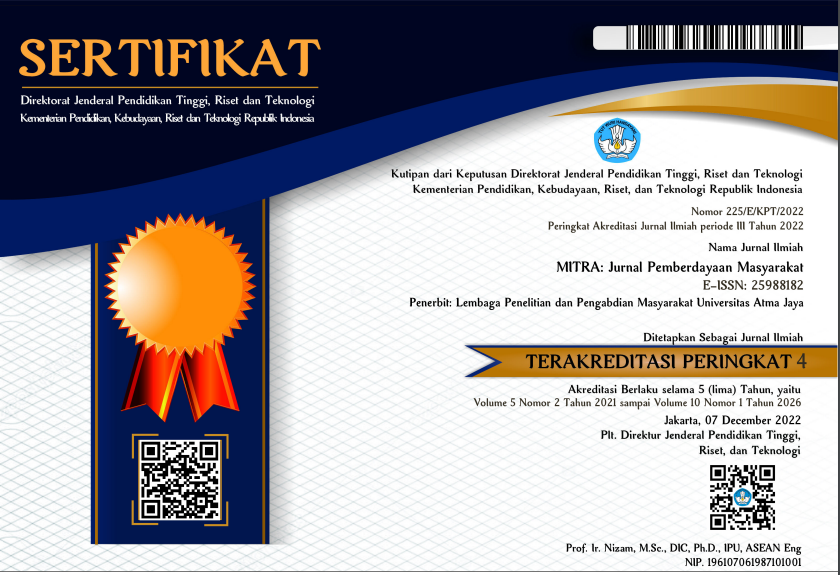Developing Knowledge and Skills of Culinary Entrepreneurship for Women in Sukoharjo
DOI:
https://doi.org/10.25170/mitra.v4i2.1366Kata Kunci:
skills, entrepreneurship, culinary, knowledge, women entrepreneursAbstrak
This community engagement activity aims to provide the development of entrepreneurial knowledge and skills for women in Sukoharjo. The activity is located in Cangkol Village, Mojolaban District, Sukoharjo Regency, Central Java. This village is located east of Surakarta City and is one of the villages that become prioritized as a culinary tourism village in Sukoharjo. In a preliminary survey conducted by the community engagement team from Universitas Tarumanagara, it was concluded that this village did not yet have a superior culinary product that can be highlighted as a unique food product by Cangkol village. Several stalls that market culinary products in the culinary centre of Cangkol village offered food that was relatively limited in choice and had no special uniqueness. The present community service program aimed to promote the development of entrepreneurial knowledge and skills for women in Sukoharjo. The program was conducted at Cangkol village, Mojolaban District, Sukoharjo Regency - Central Java. This village is located on the east side of Surakarta and is one of the villages prioritized as a culinary tourism village in Sukoharjo area. In accordance with the agreement with our community service partners, namely Cangkol Village, the community service program was held by providing training on culinary entrepreneurship. The culinary business chosen was organic soy sauce. In addition to providing basic training on entrepreneurship such as the process of identifying business opportunities, product marketing, and financial management, in this training the community engagement team also invited SME owners from the culinary field who owned organic soy sauce business. The purpose of inviting speakers from culinary SMEs was to improve the skills of community service participants in processing products delivered by SMEs. The results of this activity were believed to have developed the entrepreneurial knowledge and skills of the participants, especially those involved in soy sauce businesses.
Referensi
deBruin, A., Brush, C. G., & Welter, F. (2007). Advancing a framework for coherent research on women’s entrepreneurship. Entrepreneurship Theory & Practice, 31, 323–339.
Dayal, S. (2017). Why inclusion makes economic and cultural sense: Dissident masulinities in Indian cinema in Time for Solutions!: Overcoming Gender-related Career Barriers, edited by Susan M. Adams. 2018. Routledge.
https://lifestyle.kompas.com/read/2019/08/23/092732720/permintaan-produk-organik-diindonesia-meningkat.
https://www.depkop.go.id.
Menzies,T.V., Diochon, M., & Gasse,Y. (2004). Examining venture-related myths concerning women entrepreneurs. Journal of Developmental Entrepreneurship, 9, 89–107.
Musta, R., Nasruddin, N., Nurliana, L. & Sabilu, M. (2020). Pelatihan pembuatan kecap berbahan dasar air kelapa untuk ibu-ibu rumah tangga. Amal Ilmiah: Jurnal Pengabdian kepada Masyarakat,1(2), 96-101.
Rahmawaty, S. & Kurnia, P. (2009). Pembuatan kecap dan cookies ampas tahu sebagai upaya peningkatan potensi masyarakat di sentra industri tahu Kampung Krajan, Mojosongo, Surakarta. WARTA,12(1), 1-7.
Selamat, F., Tunjungsari, H.K., Ie, M. (2017). Dasar-dasar kewirausahaan: Teori dan praktik. Jakarta: Indeks.
Unduhan
Diterbitkan
Cara Mengutip
Terbitan
Bagian
Lisensi
This license allows reusers to distribute, remix, adapt, and build upon the material in any medium or format for noncommercial purposes only, and only so long as attribution is given to the creator. If you remix, adapt, or build upon the material, you must license the modified material under identical terms.







_.jpeg)




.png)
2.png)
.png)
.png)



